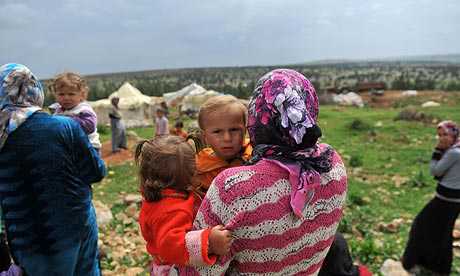Mortar kills 20 at Damascus university as Turkey denies expelling refugees
Syrian rebels bring war to capital as UNHCR investigates claims that Turkey forced refugees back across border after protest
Martin Chulov in Beirut
guardian.co.uk, Thursday 28 March 2013 19.34 GMT

A Syrian refugee carries her children near the Turkish border. Ankara denied expelling scores of Syrian refugees after a protest. Photograph: Bulent Kilic/AFP/Getty
A mortar strike on Damascus university killed about 20 students on Thursday, exposing the fragility of the capital’s most sensitive zone to attack.
Syrian officials blamed rebel groups for the strike, which wounded dozens more students. The opposition denied responsibility. All the victims had been in an outdoors cafeteria near the heart of the campus. It was the second consecutive day that mortars had hit the city. An attack on Wednesday struck near a hotel, causing damage but no casualties.
The presidential palace has in recent weeks also been hit by rockets and mortars fired by rebel groups, who have consolidated inroads they made earlier this year on the city’s southern and western outskirts.
The groups are a mix of Islamist-leaning and more secular brigades. The jihadist group Jabhat al-Nusra is also active, particularly in the Yarmouk Palestinian refugee camp nearer the heart of the city, which it entered in January.
Throughout the first three months of the year, loyalist forces and rebel groups have fought a series of savage battles on the urban fringes, often involving rockets and mortars and air strikes from the regime side. Rebels have been trying to cut off access to Damascus airport and to use the area as staging ground for an assault on the capital, which is protected by two of the Syrian military’s most capable divisions and a large special forces unit.
Loyalist forces also command the high ground around Damascus and use mountains and ridges to shell rebel-held areas.
Central Damascus, despite resounding to the sound of regular incoming and outgoing fire, has not been a main battlezone. Despite prolific military checkpoints, life in the city has appeared more normal than in many other Syrian towns and cities, allowing officials to project an air of “business as usual”.
However, a succession of apparent suicide bombings, including an attack last week inside a mosque that killed a leading Muslim imam, are eroding trust in officials to keep the war far from the most important state institutions.
Large numbers of Damascus residents, including much of the middle class and refugees, have fled the city for Lebanon or Jordan, both of which are now groaning under the influx. Lebanon alone is believed to be hosting 350,000 children of school age. Many thousands more have not been registered by authorities.
Aid dollars have started to reach the sprawling tent cities that are housing the refugees, who number more than one million with those who have fled to Turkey included. The onset of spring, after a sharp but mercilessly short winter, has eased housing fears, but the camps remain in desperate need and often squalid.
Brawls broke out at a camp near the Jordanian border on Thursday and Turkish riot police used water cannons in a camp in Akçakale after refugees protested over the death of a child from a tent fire, in which three other people were also wounded.
The UNHCR, the UN refugee body, said it was investigating claims, denied by Turkey, that up to 60 Syrians from the camp’s 25,000 residents, had been forced to return to Syria after the disturbance.
via Mortar kills 20 at Damascus university as Turkey denies expelling refugees | World news | guardian.co.uk.

Leave a Reply